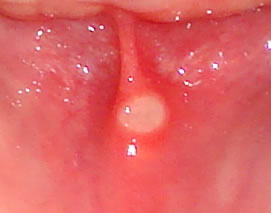The exact cause of canker sores, those extremely painful and annoying, small round ulcers that can appear inside the mouth, is not fully known. Experts believe there is more than one trigger but they do not appear to be caused by viruses or bacteria. While not contagious, they tend to run in families.
 Canker sores, also known as mouth ulcers or aphthous stomatitis, affect approximately 80% of the U.S. population sometime in their life and often first appear between the ages of 10 and 20. While anyone can develop a mouth ulcer, twice as many women as men get them. There may be an allergic reaction to certain foods or a minor injury to the mouth may trigger them. There is some research that indicates problems with the body’s immune system may be involved for some people. Canker sores are not cold sores or fever blisters, which only appear on the outside of the mouth, nor are they associated with herpes viral infections.
Canker sores, also known as mouth ulcers or aphthous stomatitis, affect approximately 80% of the U.S. population sometime in their life and often first appear between the ages of 10 and 20. While anyone can develop a mouth ulcer, twice as many women as men get them. There may be an allergic reaction to certain foods or a minor injury to the mouth may trigger them. There is some research that indicates problems with the body’s immune system may be involved for some people. Canker sores are not cold sores or fever blisters, which only appear on the outside of the mouth, nor are they associated with herpes viral infections.
While there is no single cause of canker sores, there are a variety of factors that may be involved in triggering a lesion:
Typical Triggers:
- A minor injury to the mouth from dental work, braces on teeth irritating the inside cheek, poor fitting dentures, accidentally biting your tongue or cheek, aggressive teeth brushing, sharp edge of a broken or chipped tooth.
- Stress – Emotional stress may trigger a canker sore in some people. If you find you are getting canker sores when you are under a lot of pressure at work or school or lacking sleep, that may be a trigger for you.
- Hormones and Menstrual Cycle – Female sex hormones apparently play a role in causing canker sores. Many women have bouts of the mouth sores only during certain times of their menstrual cycles. Most women find improvement or their canker sores stop occurring when they are pregnant. This may help explain why mouth sores are more common in women than men. Researchers have successfully used hormone therapy in clinical studies to treat some women.
- Food allergies and sensitivities – Chocolate, eggs, cheese, nuts and highly acidic foods or drinks like pineapple, strawberries and orange juice may trigger canker sores in some people.
- Sodium laurel sulfate (SLS), a foaming agent found in most toothpastes and mouthwashes, can be an irritant and may be associated with the development of mouth ulcers.
- Nutritional deficiencies – Doctors have found that diets low in B12, folic acid, zinc, or iron may contribute to outbreaks of canker sores.
- Gastrointestinal problems – In a small percentage of patients, canker sores occur with problems such as Celiac disease, an intestinal disorder caused by a sensitivity to gluten, a protein found in wheat, barley and most other grains. Inflammatory bowel diseases, including ulcerative colitis and Crohn’s disease may also cause them.
Who is More Likely to Get Them?
- Women – The mere fact of being female increases the likelihood of getting canker sores, especially small clusters.
- Family history – About a third of people with frequent bouts of canker sores have a family history. So if you have parents or siblings with frequent mouth ulcers, you may be more likely to develop them too. There are a variety of reasons for this, it may be due to certain allergens or heredity.
- Faulty Immune System – Patients with compromised immune systems, such as those with HIV/AIDs or other immune system disorders such as anemia, may be more likely to develop canker sores.
While no one is certain what causes canker sources, if you get frequent outbreaks most doctors recommend that you undergo blood and allergy tests to see if your ulcers are caused by a nutritional deficiency, an allergy or another preventable cause.